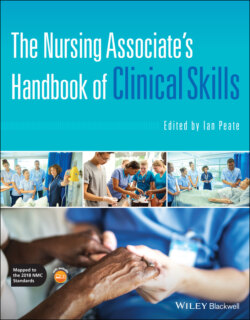Читать книгу The Nursing Associate's Handbook of Clinical Skills - Группа авторов - Страница 37
Introduction
ОглавлениеTo be a successful nursing associate, excellent communication skills are required. Effective communication requires the nursing associate to develop and maintain the required knowledge, skills and behaviours that enable them to work effectively with a wide range of people across the lifespan and during times where there are challenges to effective communication. The Nursing and Midwifery Council (NMC) (2018a) Nursing Associate Standards of Proficiency, at the point of registration, require the registered nursing associate to have the underpinning knowledge and communication skills to provide and monitor care. The NMC standards of proficiency also require the nursing associate to communicate effectively using a range of skills and strategies with colleagues and people at all stages of life and with a range of mental, physical, cognitive and behavioural health challenges.
In chapter 1, the underpinning theories and models of communication were discussed. This chapter will explore a range of communication approaches and the skills required to overcome some of the obstacles to effective communication. It will highlight the skills required when communicating with different age groups and the actions to be performed in challenging or complex situations.
As humans, we thrive on interaction with others. We learn to communicate at a very early age; as babies, we are able to communicate our wants and needs through cries and smiles (Grainger 2018). Those positive connections give us a sense of belonging and value. When done well, communication is a two‐way process that involves listening, observation, body language, facial expressions and speech from all parties involved. Effective communication is extremely important at times of ill health or crisis (Raphael‐Grimm 2014). Yet, communication is one of the five most common reasons for complaints in the National Health Service (NHS) in England (Parliamentary and Health Service Ombudsman 2019). It is vital for all healthcare professionals to understand the impact of their communication with the people they are caring for. Nursing associates have a legal and professional obligation to develop the skills to ensure that each interaction is effective and meaningful (Nursing and Midwifery Council 2018a).
